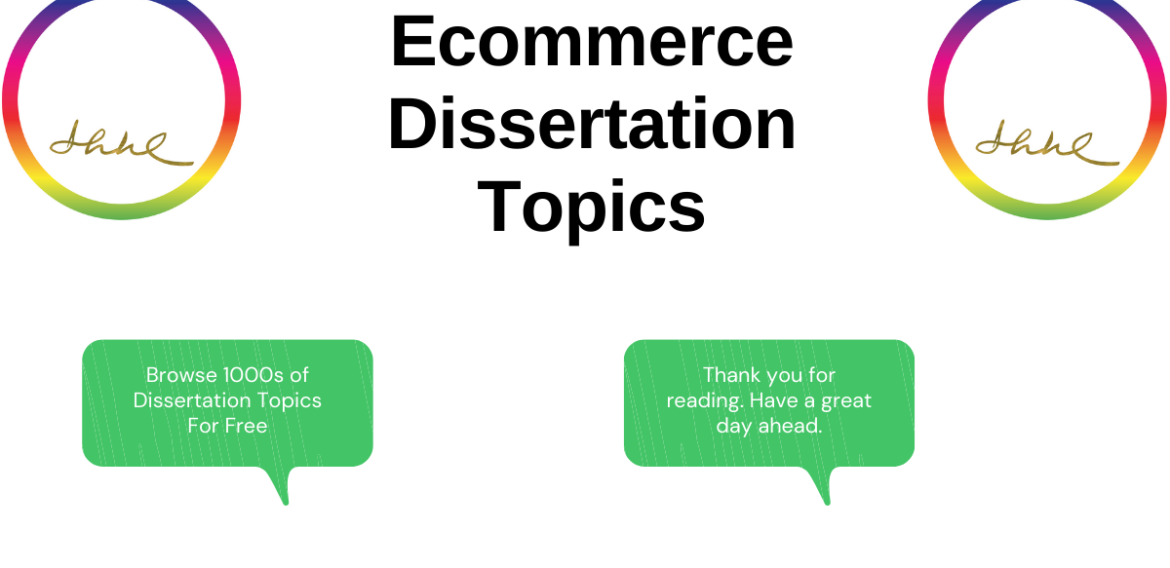Ecommerce Dissertation Topics
Strategy For Ecommerce Topics
- In light of a business’s demand and capacity to sell its service or product, e-commerce has developed as a crucial technique of conducting business. It is one of the fastest growing technologies in the retail industry. Despite the fact that numerous tactics can be employed to advance e-commerce development, a technical gap persists. A business’s unique selling proposition (USP) is crucial. This is meaningless in the world of e-commerce. The productivity and profitability of an e-commerce strategy are strongly connected to its ability to identify the USP. For instance, supermarkets that enable customers to purchase things online and have them delivered to their front doors can occasionally contribute to the USP merely through the platform’s use (the Internet). Additionally, the buyer must get the perception that they may purchase at their leisure and are not inconvenienced by the have to visit a physical store. There is a risk that the USP would be diminished as the number of online retailers increases. The following are some possible topics for e-commerce dissertations in this field:
- An assessment of the e-commerce tactics of established businesses (Migration)
- A study of emerging corporate e-commerce tactics.
- An analysis of the Internet e-commerce tactics of established businesses (Migration)
- E-commerce strategies: a stroke of good fortune or a calculated move?
- A successful e-commerce strategy should incorporate the following components.
- A study of online branding strategies
- How to make the most of technology
- How can service create a competitive edge in e-commerce?
- Change management strategy and internal business procedures
- Business Process Reengineering: Myth or Reality?
- Investigating solutions for value development in Internet-based enterprises
- Measuring the success of an e-commerce strategy (Case study)
- An evaluation and assessment of e-business knowledge management strategies
- A novel approach is offered for developing e-business strategies.
- A business plan for an educational institution’s online commerce venture
- A plan for Small and Medium-Sized Enterprises (SME) e-Commerce
- The e-commerce strategy of a B2B organisation.
- Examining the various payment processing methods
- How does social media affect the e-commerce process?
- What role might e-commerce play in enhancing firms’ relationships with their customers?
- Why is the customer so concerned about the unique selling point and the expansion of e-commerce?
Editingarsenal has compiled a list of some of the most popular and common dissertation topics from a variety of academic disciplines, so you can pick and choose what to write about. If you need dissertation editing assistance , don’t hesitate to contact one of our qualified and experienced editors and proofreaders.
Ecommerce Trust and Security Topics
- Security and trust in e-commerce are critical problems. Many individuals are concerned about the security of e-commerce. Third-party attacks on lawful transactions between a merchant and a customer, as well as fraudulent businesses’ threats to customers, represent a security and trust risk. In e-commerce, these security and trust issues originate from two sources. To foster a more secure environment, it is vital for businesses and their online presences to identify security risks and threats. A growing proportion of clients, particularly in banking, are concerned about security concerns. Additionally, they are concerned with the creation of safe online commerce networks.
- Third-party assaults are a perpetual source of concern. Hackers may gain access to credit card details, bank account numbers, and even personal information in an attempt to perpetrate identity theft. This threat has increased in significance as a result of the advancement of new digital technologies. Retailers are required by law to safeguard the privacy of any personally identifiable information they gather. SSL, firewalls, intrusion detection systems, and other technologies all contribute to the protection of websites against hacking. Customers’ lax security also promotes assaults from outside parties. The following are some dissertation topics for e-commerce:
- An examination of the condition of e-commerce security technology at the moment.
- An examination of prior attacks and the problems that contributed to them.
- Firewalls are susceptible to a variety of security issues and attack tactics.
- SSL Vulnerabilities and Attack Methods – SSL Vulnerabilities in security and attack methods that could exploit them
- Today’s effectiveness of detection technologies.
- The security policies of a website are thoroughly analysed.
- An investigation of the firewall policies that govern a website.
- Public perceptions of security.
- Educating the public on safety issues.
- Cryptography’s State-of-the-Art.
- To what extent is today’s encryption capable of preventing eavesdropping and other illicit types of interception?
- Customer confidence and their perceptions of how their data is handled.
- Constraints and problems associated with online security.
- What additional measures can online merchants, banks, and other financial institutions take to increase the security of online transaction
Ecommerce Website Usability Topics
- Consumers abandon badly designed websites if they require too many clicks or if they must search for what they are looking for, which is why website usability is crucial for online shops. Customers will not return if the content is difficult to use. Websites must be exceedingly user-friendly in order to be successful in today’s industry. The layout and design of the website should strike a balance between simplicity and the presentation of all necessary information. Additionally, technology is being leveraged to enhance customer service through the usage of live chat on the e-commerce website and 24-hour phone assistance. Customer service in e-commerce has a lot to gain from the next generation of Internet applications, such as the semantic web and natural language search (collectively referred to as Web 3.0). The following are some dissertation topics on usability in e-commerce:
- An in-depth examination of how customer support representatives utilise modern technology.
- Web 3.0 applications for customer service are currently being developed.
- Developing a new customer service application for Web 3.0.
- Developing semantic web applications for marketing purposes.
- Effectiveness of e-commerce website usability concepts.
- Do the Web Consortium’s standards contribute to the usability of a website?
- A study of the usability of a single significant e-commerce website (such as Amazon).
- Retailers lose money due to ineffective retail e-commerce website usability.
- Measuring the usability of e-commerce through metrics.
- Evaluating the critical usability characteristics of e-commerce websites based on customer preferences.
- One or more surveys on the usability of e-commerce websites (s).
- Refactoring business processes to improve the usability of e-commerce websites.
- The importance of usability to client pleasure and loyalty on a fashion retail website.
- Usability and user experience of travel and tourism industry mobile geo-referenced apps.
Ecommerce Marketing Topics
- E-commerce development requires the establishment of a business or brand. This is accomplished through the effective use of the many marketing and advertising methods available to a business. Marketing and advertising for e-commerce are key components of a business’s entire strategy. Marketing and advertising for a business encounter numerous challenges, and it is critical that the business remains visible to the customer. Paid keyword search advertisements, banner advertisements, and the use of Web 2.0 applications that advertise on social media have all altered how marketing and advertising campaigns operate. To establish consumer and brand loyalty through e-commerce, it is vital to have platforms that engage people. This can be accomplished by developing promotional strategies. With today’s wealth of data, it is feasible to target clients accurately based on their profiles, networks, and other characteristics. To take use of the potential, you’ll need a thorough understanding of the technology’s mechanics. When designing social media plans, it is critical to understand that the organization’s digital word-of-mouth is incredibly valuable and costs nothing. Businesses may now reach a far larger audience thanks to the internet and social media. The following are some suggestions for your e-commerce thesis paper:
- E-commerce is reliant on search engine rankings.
- A strategy for search engine marketing.
- Internet marketing is a method of promoting your business.
- E-commerce Is it purely online or does it have a foot in both hemispheres?
- Cost per click (CPC) versus cost per impression (CPI).
- A marketing approach for e-commerce (case study).
- An examination of an e-commerce business’s advertising approach (case study).
- Analytical issues and empirical evidence on e-commerce marketing tactics.
- Evaluation of the efficacy of e-commerce advertising (case study).
- Advertising effectiveness in e-commerce (new method or algorithm proposed).
- Customer retention for e-commerce portals.
- Customer behaviour analysis is used to inform marketing strategy.
- What is it about an online retailer that entices customers to return repeatedly?
- Traditional retailers should market their items on the internet.
- Internet advertising for startups (born on the Internet).
- The Internet marketing industry is considering a paradigm shift.
- How effective is social media in attracting and converting customers?
- What role does digitalized word of mouth play in the internet marketing strategy of an organisation?
- The impact of the internet on marketing and e-commerce, as well as brand loyalty.
Mobile Ecommerce Topics
- A mobile e-commerce platform, alternatively referred to as m-commerce, is the way of the future for online buying. In an increasingly networked and mobile world, the Internet is no longer constrained by a desktop and a landline. Numerous mobile devices currently support it. Among them are cellphones and tablets. As a result, astute retailers have optimised their content and delivery techniques for the mobile commerce platform. M-commerce can take on a variety of forms, from profiteering from client calls and texts to custom-designed mobile platform applications. The following are possible dissertation topics in m-commerce:
- Wireless security is required for mobile commerce.
- Examining the potential of mobile commerce.
- Payment processing methods for m-commerce.
- m-commerce e-commerce software developed on a custom basis.
- Examining business models for mobile commerce.
- Usability of m-commerce applications.
- Mobile client technological issues and bottlenecks.
- Issues with cellular technology, particularly congestion.
- UI design for mobile commerce.
- Mobile commerce is constrained by capacity constraints on wireless networks.
- The interface is a wireless to wired e-commerce application.
- It is required to identify each user uniquely for m-commerce.
- Data security in m-commerce is a big concern.
- Decision-making in e-commerce is distinct from decision-making in mobile commerce.
- What barriers remain in the way of a broader adoption of mobile commerce in underdeveloped countries?
- Are consumers more receptive to m-commerce if the payment provider has a favourable reputation?
- Mobile commerce can be used to accomplish strategic company objectives.
Law and Ecommerce Topics
- Governments throughout the world have demonstrated a tendency to be relatively slow to respond to technology advancements and, in particular, e-commerce. To summarise, it is probable that legislation in this area were passed at the request of powerful lobby organisations concealed behind major for-profit firms, leaving customers to shoulder the burden. Several examples spring to mind:
- The United States Copyright Act has been expanded to benefit the Disney Corporation, at their request.
- The Digital Millennium Copyright Act unquestionably benefits the Records Industry Association of America (DMCA).
- The following are some potential dissertation topics in e-commerce worth examining further:
- Legislation affecting e-commerce that is region-specific.
- The DMCA’s impact on e-commerce.
- E-commerce and the recent amendments to the American Copyright Act.
- Effects of the Berne Convention on electronic trade.
- Review of the UK’s e-commerce regulations.
- Is it possible for a computer crime to be committed outside the jurisdiction of any country if it crosses borders?
- Sealand as a virtual utopia: Is this the future?
- Is Sealand a secure haven for hackers?
- Should legislation criminalise P2P networks in order to safeguard the bulk of genuine businesses?
- Peer-to-peer networks and e-commerce.
- Software patents: a sure-fire method of amassing a large nest egg?
- Both e-commerce and pornography are growing in popularity.
- Is Brexit likely to have any effect on UK e-commerce law?
- What can UK policymakers learn from other nations’ e-commerce legislation that will assist them improve UK law?
- How may the most serious faults in UK e-commerce regulation be addressed most effectively, as recognised by new legislative enactments?
Ecommerce Legislation Topics
- Numerous countries have enacted legislation to safeguard computer networks from external dangers and to rapidly prosecute any “attackers.” For instance, in the United Kingdom, legislation such as the Computer Misuse Act 1990 and the Police and Justice Act 2006 have been enacted and implemented to assist in the prevention and prosecution of computer security breaches. As a result of the breadth of this field of law, the following are some potential dissertation topics for you to investigate:
- The Computer Misuse Act of 1990 encompasses a plethora of provisions.
- Numerous factors must be considered when examining the 2006 Police and Justice Act.
- Is the United Kingdom’s computer security legislation up to date or woefully out of date?
- A global examination of computer security legislation.
- How effective has national and international regulation been in deterring cyber-attacks?
- What effect will Brexit have on the legal framework governing the protection of computer networks against external threats and the prosecution of individuals guilty for attacks?
- External risks to computer networks have advanced more rapidly than the law.
- What lessons may UK policymakers learn about computer network security from the legal systems of countries outside the European Union as a result of Brexit?







